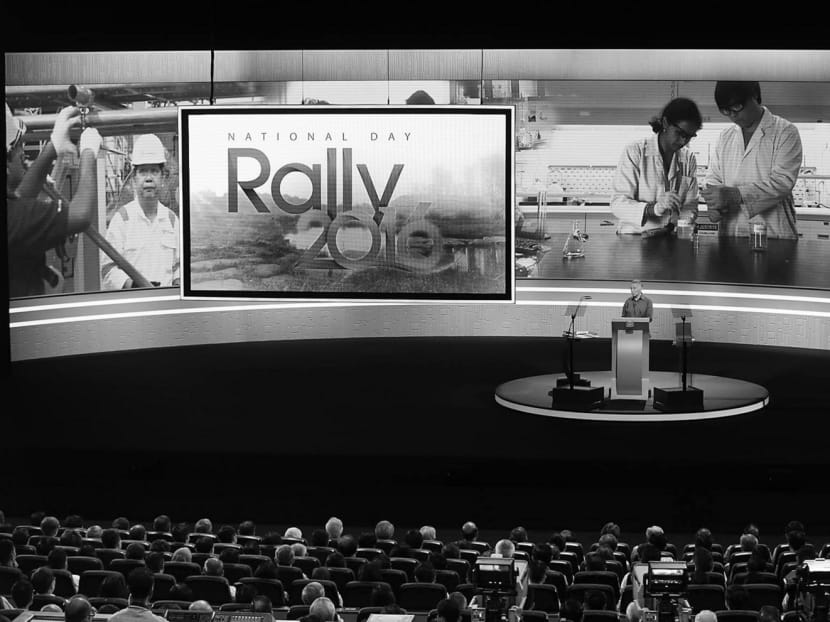What S’poreans can do to build the country’s future
Singapore’s place in the world is never secure, even though it has been at peace since independence.

The writer believes that the National Day Rally this year was sobering as Prime Minister Lee Hsien Loong fleshed out the tough challenges ahead and asked Singaporeans to consider the progress, place and politics they want for the nation. TODAY file photo
This year’s National Day Rally, being the first after Singapore’s Golden Jubilee, had a different focus from previous rallies. Instead of making policy announcements, Prime Minister Lee Hsien Loong took the opportunity to challenge Singaporeans to play a more active role in building the nation.
It was a sobering rally — in more ways than one, but more on that later — as Mr Lee fleshed out the tough challenges ahead and asked Singaporeans to consider the progress, place and politics they want for the nation. In doing so, the focus rightly turns to what the country’s citizens can do to chart its direction towards SG100. Singapore’s progress is not inevitable, even though it seems so when the country’s GDP per capita has increased by over 100 times from the nominal US$500 (S$676) in 1965 to US$56,000 in 2015. Technologies such as connected devices make everyday life easier, but also enable new companies such as Amazon and Airbnb to disrupt business models.
The Government has rolled out various initiatives to help businesses and employers build up capabilities and compete globally. Regardless, it is up to individuals and companies to want to do better. For instance, to be able to create a game such as Pokemon Go, skills in location-based augmented-reality computing would be required. These skills are usually obtained after formal education because they never existed when the programmer was in school. Therefore, each Singaporean has to take personal responsibility for his or her lifelong learning through the SkillsFuture movement, as skills that are sought after will keep changing.
Companies have to step up, too. They can either choose to seek the Government’s protection to survive, even at the expense of their customers who cannot benefit from the globally driven disruptions, or seek to learn from these disruptions to serve their customers even better. For example, rather than clamouring for more restrictions on Grab and Uber private drivers to even the playing field, taxi operators can choose instead to adopt dynamic pricing mechanisms and incentives with easier-to-use booking apps to provide better value to their drivers and riders. Smaller hotel operators in Singapore can either choose to lobby against Airbnb from facilitating the renting of rooms in Singapore, or choose to leverage the Airbnb matching platform to rent out their rooms, like what other overseas operators do.
Singapore’s place in the world is never secure, even though it has been at peace since independence. China’s growing influence and assertiveness could have an impact on freedom of navigation in the South China Sea, which serves as Singapore’s trade artery. The United States will want to hold on to its preeminent role in the Pacific. The consequences from the tussle between these two big powers are right at Singapore’s doorstep. Singaporeans with business and personal links with the Republic’s neighbours and big powers can adopt an ambassadorial mindset in their daily interactions. Rather than staying silent, Singaporeans can explain their country’s actions when people criticise Singapore for not aligning with their countries’ interests.
POLITICS AND TERRORISM
The terrorism threat from religious fundamentalism has never been more serious. This is evident not only by the attacks that have taken place around the world and in the region in recent months, but also in the number of arrests in Singapore this year of persons who have been radicalised through social networks. Rather than just depending on the authorities to secure the environment, Singaporeans are being asked to step up and take responsibility to protect themselves together through the SG Secure movement. Singaporeans’ individual actions towards one another after a terrorist attack in Singapore will be more important in restoring normalcy than any government action.
Singapore’s politics will not always be stable, even though it has experienced stable political development for decades. Each election presents an opportunity to strengthen or destabilise the nation’s political landscape. Singapore has the opportunity to increase the stability of its political system through changes to the Elected Presidency. Singaporeans’ responses to these proposed changes, regardless of for or against, can tear down or build up long-held values and the Singapore identity.
Even as race is a criterion for potential change to the Elected Presidency, the challenge is how Singapore can continue to ensure cordial race relations. Each new generation of Singaporeans can strengthen or degrade interracial bonds in the country. During the rally, Mr Lee shared many photos of him celebrating with Singaporeans from different races and religions. He is reminding Singaporeans that there is no magic bullet to improving relations between races except for regular interactions. Singaporeans have to go the extra mile to interact with citizens from different races in schools, workplaces and local communities.
One of Mr Lee’s wishes, which he shared during the rally, was for divine discontent so Singaporeans would always want do better for Singapore to sustain its progress, ensure its security and stabilise its politics together. Therefore, even as Singaporeans watched Mr Lee falter and recover during the rally, it is a poignant reminder that they have an equal, if not more important, role as citizens to take up the burden, overcome challenges and play a more active role to build their future.
ABOUT THE AUTHOR
Soon Sze Meng is a Vice President from a global company






